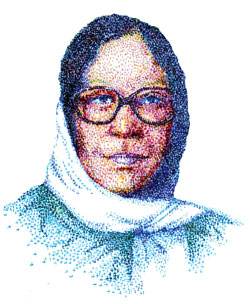 Parijat's memoirs flow with the poetic current that characterises the best of her writings. No one tells her story as compellingly as she does herself. Regular readers such as I could bypass all the self-appointed authorities and pick up her Atmasamsmaran instead.
Parijat's memoirs flow with the poetic current that characterises the best of her writings. No one tells her story as compellingly as she does herself. Regular readers such as I could bypass all the self-appointed authorities and pick up her Atmasamsmaran instead.
Parijat, born Bishnu Kumari Waiba, grew up in Darjeeling under the shade of a hardheaded, militantly atheist father. "[H]e has read Marx, read Engels, read Gandhi, read lots more, but reading alone does nothing to a person. He has read, read he has, that's all!" writes Parijat in the first part of Atmasamsmaran which is dedicated to the memory of her father.
A sickly child with an indomitable spirit, she realised early on that she resembled no one. "A world has formed inside me but I am silent." She wanted to be sociable and vivacious like Sukanya, her younger sister, but admits "[u]nnecessary pride and tenacity takes hold of me.For some reason, I can't be happy." What stirred Parijat was her surroundings. "River, looks like a blue serpent...I want to wrap the whole river round my neck." She felt an urge to write the smell of a flower. "I tell my friend I want to write this. What? She looks confused."
Unlike her friends whose love letters she wrote, Parijat experienced love only as pain. "At night I grow full of love for him, by dawn love sheds its petals one by one, like a withering flower, and I'm done for, empty! In daytime, I have nothing left to offer him except platitudes." It's as though her overpowering sense of aloneness ruled out the possibility of romantic happiness. Such happiness grew ever more elusive when, at the age of 26, Parijat was bedridden with rheumatoid arthritis. In her memoirs, she describes the realm of illness with wrenching clarity.
"I was confined to bed, and all my wishes, my dreams to play in nature, my freedoms piled up one by one before my eyes, like birds with broken wings."
Physical powerlessness, loss of love, and innate sorrow threw Parijat into an abyss of loneliness that heightened her sense of god. "I have come to accept I have an inherent faith.though I have never blamed god for my unfulfilled dreams and desires." Without god, she asks, how could man persist in this dizzying emptiness? The questions she grappled with are embodied in her best-known novel Shirish ko Phool, which departs wonderfully from familiar social realist themes.
Parijat arrived in Kathmandu as a young woman and felt an instant connection with the city. "Wide streets, big houses, a city in motion-this is Kathmandu!" Though according to her brother, there were ways to preserve one's dignity in Kathmandu: don't go to public tap for water, don't sit near the window, try to speak English in public, don't let slip you're a Tamang and so on. Given her social identity, her physical condition and her untamed spirit, one can imagine the challenges Parijat must have faced in this society. Yet her narrative, even at its most passionate, betrays neither self-pity nor rancour. And her personal relations reveal her ability to seek out the humanity of individuals.
Occasionally, as Parijat fell into a frenzy of burning manuscripts, Sukanya hid them away. "My heart aches when I see you, sister," she explained, "you write in torturous conditions." Through infirmity, destitution, and suicidal phases, Parijat wrote because writing alone sustained her. Her Atmasamsmaran illuminates her remarkable gift and courage.
Parijat, was born in 1937 and died in April 1992.


